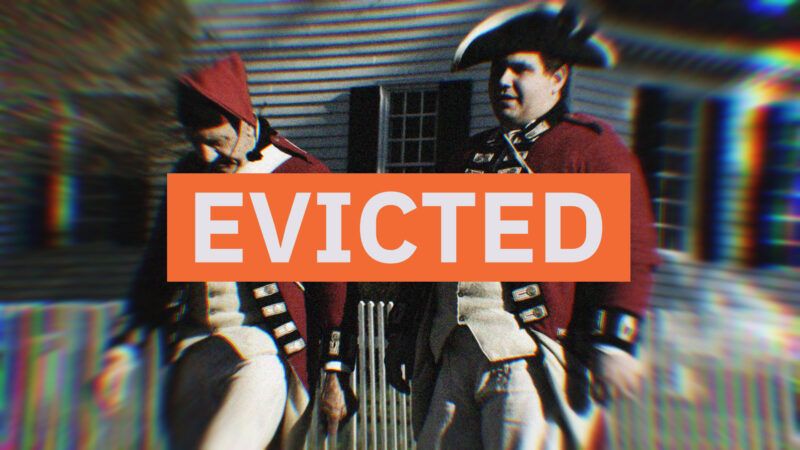Is the CDC's Eviction Moratorium a Third Amendment Violation?
The Third Amendment Lawyers Association argues in a recent amicus brief that the federal eviction ban requires landlords to quarter soldiers.

Defenders of the often-overlooked Third Amendment to the U.S. Constitution are springing into action to defeat what is arguably the biggest threat to their cause in decades: the federal government's eviction moratorium.
Last week, the Centers for Disease Control and Prevention (CDC) issued a ban on evicting non-paying tenants living in counties with a substantial number of COVID-19 cases provided that those tenants sign financial hardship declarations.
In response, the Alabama Association of Realtors and the Georgia Association of Realtors—who already sued over the previous, nearly identical CDC eviction ban that expired on July 31—filed an emergency petition last week in the U.S. District Court for the District of Columbia asking that the new moratorium be set aside.
Rallying to the side of the realtors was the normally idle Third Amendment Lawyers Association (ÞALA), which filed an amicus brief in the case on Friday.
"Ordinarily, the eviction process would play out in the courts. The CDC eviction moratorium prevents this," wrote the ÞALA. "Plaintiffs are being forced to house individuals, i.e. quarter them, without their consent. Given the size of the population at issue, some of these tenants are bound to be soldiers."
That, the group argues, violates the Third Amendment's express prohibition on quartering soldiers in private homes in times of peace without the consent of the owner.
This is a novel claim, to say the least. The Third Amendment, as ÞALA notes in its brief, is the "runt piglet" of the Bill of Rights and is rarely invoked in normal litigation.
That's certainly true for the legal challenges to the CDC's eviction moratorium. Plaintiffs have generally stuck to more common legal arguments, including that the agency's order goes beyond the powers given to the CDC by Congress, and/or that it violates the Fifth Amendment's prohibition on taking property without just compensation.
Despite the creativity of ÞALA's argument, there's reason to doubt that the CDC's eviction order will fall on Third Amendment grounds.
"My first-glance interpretation of 'quartering' is that it refers to the government placing a soldier in some house, not some house being rented, in his private capacity, by someone who happens to be a soldier," Eugene Volokh, a law professor at the University of California, Los Angeles, wrote at The Volokh Conspiracy. "So if my tenant happens to be a soldier, and he forfeits my initial consent by failing to pay his rent (and thus breaching the lease agreement), his continuing to live in my 'house' doesn't involve his 'be[ing] quartered.'"
Whether or not ÞALA's argument sways any judges, its brief is a reminder of just how many different ways the Constitution protects the rights of property owners. Among those protections is the right to exclude people from your property, be they delinquent renters or unwelcome redcoats.
Rent Free is a weekly newsletter from Christian Britschgi on urbanism and the fight for less regulation, more housing, more property rights, and more freedom in America's cities.


Show Comments (52)